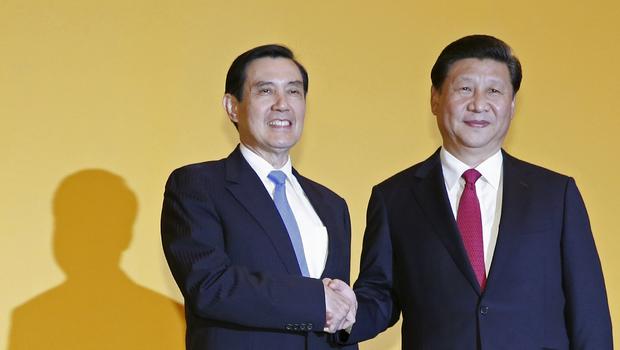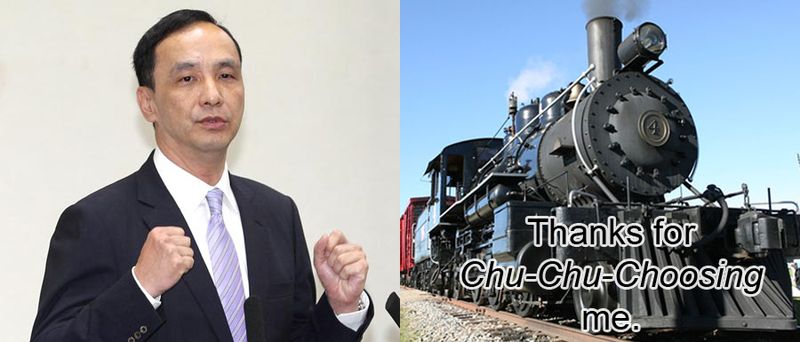Usually with these blog posts I pick a viewpoint and defend it, but this time I'll break with convention and simply list a few arguments and let the reader decide which are the most persuasive. The arguments will be:
- Yes, the KMT is being fair with Hung Hsiu-chu.
- No, it isn't being fair with her.
- What's "fair" got to do with it?
- Final rebuttal.
Again, the post is simply about the fairness of the KMT's treatment of Hung Hsiu-chu, and not whether the party is breaking its own rules or Taiwanese law. A good treatment of that is something I'd very much like to read (but am sadly not competent to write myself).
Argument #1: The KMT IS being fair with Hung Hsiu-chu
Hung Hsiu-chu is the KMT's presidential candidate, and as such, receives KMT money to pay for her campaign. She also depends upon the KMT's political machine to run her campaign, and upon the KMT's name to put her in the spotlight.
And yet, despite all those advantages given to her by her association with the KMT, Ms. Hung refuses to sing from the KMT hymnal – preferring instead to advocate a type of extreme Chinese unificationist philosophy which is counter to party orthodoxy.
She also refuses to accept advice from the KMT leadership, and frequently blindsides the party with her words and deeds.
The KMT has given Hung Hsiu-chu a lot, and received very little in return. With her campaign going down in flames (and taking the party down with her), the KMT is fully justified in pulling the plug on her candidacy.
Argument #2: The KMT has been grossly unfair to Hung Hsiu-chu
Argument #1 is partly based on the notion that Ms. Hung obtained her nomination by misrepresentation and fraud. This is categorically untrue.
Hung's views
From the beginning, Hung made her views well-known…and the KMT nominated her anyways. She performed no bait-and-switch — the KMT went into this with its eyes wide open, with full knowledge that her position on unification was outside of the party's mainstream. It is not she, but the KMT, which is responsible for the current fiasco.
To illustrate: recall that in early June, Hung Hsiu-chu first floated her "one China, one interpretation" theory. A unificationist position. And what was the KMT's response?
The timeline shows that on June 17th, the party's Central Standing Committee confirmed her candidacy as the KMT's presidential nominee. If her views were really so objectionable to the KMT, why would it confirm her nomination?
Furthermore, in early July, Hung publicly stated that she couldn't say whether the Republic of China actually existed. Another unificationist position. Again, what did the KMT do when it learned of this?
Did the party admonish her, saying, "Your views are far outside the KMT mainstream, and you are unfit to be our nominee?"
No, no, it did not. Rather, on July 19th, the KMT's National Congress assented to Hung's candidacy by a solid majority with a round of applause. Once more, if the KMT found Ms. Hung's views so abhorrent, then why did it so readily assent to her candidacy?
Hung's relationship with the KMT hierarchy
A similar case can be made regarding Hung Hsiu-chu's pig-headed rigidity in her relations with her party.
Back in early June, Hung's chief rival Tsai Ying-wen (of the DPP, Taiwan's main independence party) went on a 12-day tour of the U.S.A. Tsai met privately with some U.S. officials, gave some lectures, did a few Q&As…and the people she met with saw she wasn't some wild-eyed, flame-breathing independence firebrand. Her trip was a huge success, with her interlocutors regarding her as a serious and sober politician.
Not to be outdone, KMT Chairman Eric Chu suggested that the KMT's nominee for president also visit the States, where he averred she would make just as good an impression.
Ms. Hung turned the party chairman down. Flat.
Now, anyone who's ever lived in Taiwan or China would recognize that Chu's "suggestion" was nothing of the kind — it was a request couched as a suggestion for politeness' sake.
I leave it to others to decide whether Chu was irritated, insulted, or humiliated by Hung's refusal. The point is, it didn't go down well.
And the larger point is that the KMT witnessed this brusque treatment (and doubtless, observed other cases where she brushed aside the party's requests and advice). And with all this knowledge of her temperment, it still went through two nomination procedures (on June 17th and July 19th, remember) to nominate her anyway.
Conclusion
Prior to her nomination, the KMT had ample evidence of Hung Hsiu-chu's ideology and was quite aware she was a renegade who didn't play well with others. It's a bit rich to complain about these things and use them as an excuse to remove her now, 2 1/2 months after the KMT reviewed these very same traits and found them desirable — or at the very least, forgivable.
Argument 3: What's "fair" got to do with it?
A little parable will do quite nicely. Note that it takes place in the West and not in Asia.
(The whole story breaks down completely if it takes place in Asia, as you shall soon see…)
Once upon a time, in a Western country whose name escapes me, was a restaurant in a small town. The restaurant served swill and had wretched customer service — but since it was the only restaurant in town, customers had no where else to go.
This persisted for 40 years, until at last a new restaurant opened across the street. Customers flocked to the competition, and the original diner began bleeding red ink.
The owner of the original restaurant grew sorely afraid, and he scrambled to see what he was doing wrong. From a set of customer surveys, he was dismayed to discover that his eatery had only a 9% approval rating. What, oh what, could he do?
The next day, as chance would have it, a chef walked in asking for job. "Hire me," she said, "and I will turn your business around. For I know how to prepare a dish – a wonderful dish – a dish which is wildly popular in the far-off land of Taiwan."
"What is the name of this dish," asked the restauranteur, "this dish which will put my business back on the top of the heap in this hick burg?"
"Chou dofu," replied the chef. "Otherwise known as 'stinky tofu'. "
Taken aback, the owner said, "I do not know of this 'stinky tofu' of which you speak. And I have great reservations about any food which has the word 'stinky' in its name. Nevertheless stranger, I shall hire you — for without a change to my current business model I shall most surely be bankrupted."
And so it was that the new chef (a stubborn, sharp-tongued woman who enjoyed eating spicy chili peppers) set to work. Day and night she toiled — for two and a half months — preparing the stinky tofu. A dish which is so beloved that it is served in night markets and food carts everywhere across the beautiful far-off land of Taiwan.
At the end of two and a half months, the restauranteur approached the chef and would speak with her. And the chef smiled, for she knew she was about to receive high praise for single-handedly saving the poor man's business.
"Wretch!" the owner cried, "Your stinky tofu smells like shit, of which I am not fond. More importantly, my few remaining customers flee from their seats to escape the foul stench, and tell all and sundry to avoid my diner whatever the cost. Be thee then gone from my sight, and do never return!"
Did any injustice really occur here? The chef gave what she promised, and the restauranteur gainfully employed her for a time.
But tastes differ in Taiwan and the West. And all chefs know they will not long have work if they persist in making food that doesn't appeal to their customers…
Same deal with politicians and voters.
Argument #4: Final rebuttal
At a certain point, the analogy in the previous argument breaks down. Most presidential nominees have the expectation that they will be permitted to continue on until the election, come what may. This is so true that one is hard-pressed to present an example of ANY major party's nominee being ousted in such a manner as Hung Hsiu-chu.
Chefs don't have that expectation.
If a party's nominee (and the general public) have a reasonable expectation about the rules of the nomination game and those rules are summarily violated, then it does indeed make sense to say something unfair has occurred.
(To which I suppose the rejoinder would be, "Well, what about the party's expectations?" Which brings this blog post full-circle, back to Argument #1…)
UPDATE (Oct 18 / 2015): More on the death throes of Hung Hsiu-chu's campaign:
- Hung Hsiu-chu Campaign Death Watch
- Hung Hsiu-chu Campaign Death Watch: Give Me 20 cc's Of Alarmism, Stat!
- Is The KMT's Party Coup Against Its Presidential Nominee "Fair"?
- "Little Hot Pepper" Gives KMT Indigestion (Hung Hsiu-chu finally stripped of KMT's nomination)

